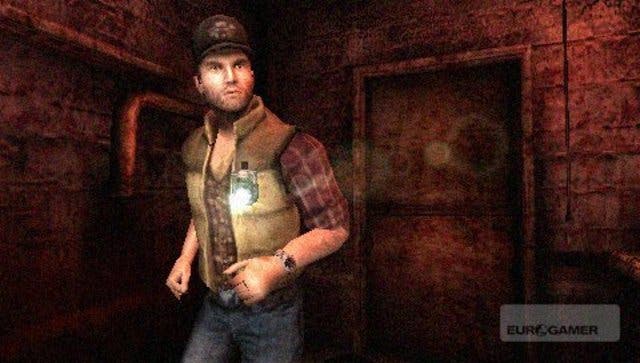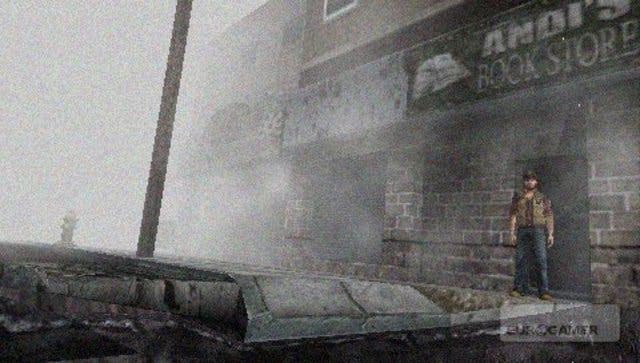Silent Hill Origins
Enjoy the silence.
Sometimes you have to back to go forward, or at least that seems to be the rationale behind Climax's somewhat by the numbers take on the Silent Hill franchise. Origins acts as the starting point for the entire series, taking us back to events before the 1999 PlayStation classic and helping to shed a little more light on the mysteries surrounding this fog-bound town.
The latest unfortunate to run the gauntlet from twisted apparitions, bald, headless bovine and manic showroom dummies is Travis Grady, a lone trucker who finds himself almost running over a young girl on a rain swept night. But rather than drive on and be thankful for this piece of fortune, he chases after her, and finds himself the latest poor unfortunate to try the handles of 900 locked doors in Silent Hill. Like everyone else who find themselves wandering this doomed place, crippling memories of a troubled past come flooding back, and so begins another chilling jaunt through a series of hellish locations and scenarios before he can resolve matters.
No doubt mindful of remaining faithful to the series' legacy, Climax pays such close attention to the ingredients of the first three Silent Hill games that it's basically an unapologetic homage to them. As such, it makes very little attempt to innovate, or take the series forward to any meaningful degree whatsoever, so as long as you're cool with that, you'll get on with Origins just fine. For those of you who've already tired of the increasingly dated formula, though, it's time to move on - nothing new to see here.
Condemnation
With that in mind, it's absolutely no surprise to see the gameplay formula reprised to such an extent that there's a permanent sense of deja vu as you traipse through the foggy streets of Silent Hill. Apart from wondering, again,when the earthquake hit, you'll positively roll your eyes when you find yourself working your way through another disgustingly grimy hospital or gloomy sanitarium. As usual, it's a game of patience and persistence, with an awful lot of time spent clicking on everything, trying door handles, flicking to the map screen and trying to work out where you haven't been. It's a curiously moreish experience, but a rather obsessive compulsive oddity - a bit like finding the urge to empty out your sock drawer to pair up all the odd ones.

Along the way, you'll pick up mysterious objects, solve the odd mildly taxing riddle, read a few sheets of discarded journals (which act as the main narrative device), and dodge a plethora of writhing, slimy monsters with slow, predictable attack patterns. But because you're also pretty cack in the combat stakes, it's just as well that the whole affair is plodding and as unwieldy as ever. Melee combat has been tweaked a touch, and you'll appreciate the fact that you can dish some meaty punches if called upon, while a ludicrous inventory system allows you to carry any number of TVs, hammers, scalpels, drip stands and other assorted guff to wield at said monsters when the moment takes you.
As for armed combat, your infinite backpack also allows Travis to pick up a service pistol, shotgun, rifle and others, and dish out the pain more effectively than trying to swish a jagged bit of wood around. With an auto-aim system, all you have to do is point and shoot, regardless of how helpful the dynamic camera angle is being. It's just as well, really, as you'd have no chance of getting a shot on target otherwise. But, as with all survival horror games, exceptionally limited ammo forces you to pick and choose what you want to blast into chunks - and, in most cases, you're often better off just running past your slow-moving adversaries until you face-off against the inevitable boss monster. Sometimes, though, if you let a monster get too close, or one takes you by surprise, you'll find yourself having to hammer the X button to fend them off. Yeuch.
Get the balance right
During your travels you'll also nip between a light (well, ok then, gloomy) and dark world every time you touch a mirror, which means you're constantly poking around hellish versions of the same location, getting new keys to unlock doors in the 'other world' and popping back and forth before you can finally get all the bits you need to solve whatever riddle is holding you back. And then you face a boss. And then get to explore a new area. And so the formula goes on until it's finally over.
And given the game is very much a reprise of everything Silent Hill fans have already experienced several times over, little old-school design decisions like badly spaced save points make it slightly less fun than it could be. Numerous times, I found myself having replay large sections because I overlooked saving it before a facing a particularly dangerous part. Why on Earth could they not have introduced automatic checkpointing pre-boss fights, for example? Being faithful to the gameplay, puzzles and combat is one thing. Being faithful to old school flaws for the sake of authenticity is misguided at best.

Visually, Origins also stays very true to the Silent Hill legacy, with delightfully detailed environments, gruesome character designs and that omnipresent atmosphere of rank decay. Sadly, where is doesn't quite hit the mark is in the human characters, which are nowhere near as detailed or as stunningly lifelike as Team Silent managed on Silent Hill 2 and 3 (4 was a Silent Hill game in name only). To an extent you can blame this on the PSP's relative limitations, but there's no reason Climax couldn't have gone that extra mile to maintain the standards. Still, despite Travis' low poly head, it's not a total deal breaker, but does remove some of the classy style synonymous with all the other games to date.
Just can't get enough
Perhaps the true saving grace for Origins is the involvement of audio wunderkind Akira Yamaoka. It cannot be overstated how important his chilling, ethereal soundtrack contributions add something utterly unique to the game, and Origins is no exception. Even when you're coldly reflecting on a rather samey gameplay experience, the fact that he's got yet more audio tricks up his sleeve transforms the atmosphere into something quite terrifying. Playing the game, as recommended, in the dark with headphones on, is sinister beyond belief if you're also on your own while playing it.
While Silent Hill Origins cannot offer its legions of fans anything they haven't seen done before (and done better), it still represents a solid stop-gap release, and is worth checking out if you're a series die-hard with a desire to fill in some gaps in the story. And even if you're not an aficionado, scary, intriguing survival horror titles such as these don't come along very often - least of all on the PSP. Although it's easy to dismiss Origins as a rather needless stop-gap release, viewed in the context of the platform, it's a quality offering that fans of survival horror should check out.










